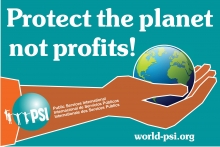Climate Change: COP21

More than 140 heads of state have made statements stressing the urgency to act on climate. The decisions that they and their delegates make over the next two weeks could well determine the fate of many hundreds of millions of humans for generations to come, not to mention that of many other species. Planet Earth will survive climate change. But which species will survive on it? And what will “survival” imply for humanity and others?
PSI General Secretary Rosa Pavanelli says :
“Our unions around the world deplore the terror attacks that hit Paris, Beirut, Tunis and Ankara. But more bombs will not bring peace. We need a new approach to dealing with terror, just as we need a new approach to climate. For PSI, this starts with governments listening to the people, and not just to the corporations or the military-industrial complex. It is based on the framework of Human Rights that all UN member states have endorsed. And it passes through universal access to quality public services in order that all can have a fair chance on this planet.”
PSI is organising two panels and participating in debates in Paris during the two weeks of the Conference from 30 November to 11 December in Paris. The perspective of public service workers needs to be heard. PSI is working with a number of affiliates, with ITUC and EPSU and with Trade Unions for Energy Democracy and Global Climate Jobs.
Humanity needs a substantive socio-economic transformation
The necessary political and economic framework for solving the climate crisis will need to focus, amongst others, on public infrastructure and public services, and on making adequate resources available to support a Just Transition for workers and communities. This will provide many new jobs, will protect the planet, and will address social injustice. The role of governments in solving the climate crisis is fundamental, as corporations have demonstrated that they are part of the problem, unable to deliver the solutions the world needs, as the market does not respond to the general interest.
The solutions to the climate challenge require a substantive transformation of the current socio-economic development paradigm, including industrial change. This is not just about some technical changes to energy production or transport systems. It is not just about adapting diesel engines to pollute less or transitioning from fossil to renewable energy. What is required is a redefinition of the predominant model of production and consumption. We must give back to the state and public services their role in supporting our communities, and ensure that workers and trade unions are able to participate fully in all steps of this process.
PSI supports the climate demands of the ITUC
Our governments in Paris should sign a universal, ambitious, binding and enforceable carbon emission-reduction agreement that goes beyond 2020; acknowledges and fairly differentiates capacity and commitments between rich countries and poor; and includes effective monitoring and review measures to halt global temperature increase beyond 2°C. The public sector and public finance will be essential ingredients of this policy mix, as specific funds are needed both to assist developing countries and to support Just Transition measures. Workers and trade unions insist on Just Transition mechanisms, whereby workers directly affected by the move to low or zero-carbon economies are assisted with retraining, new jobs and salary support. In fact, Just Transition mechanisms will require systematic consultation and participation by workers and trade unions, both at the workplace and in overall policy directions.
PSI urges affiliates to support these demands and to advocate and push their national and local governments, also in cooperation with their national federations, to adopt this position and hold it at COP21.
Relevant resources at http://www.ituc-csi.org/climate-change
Low expectations for Paris - national focus for action after COP 21
Although we can be certain that any agreement coming out of Paris will not be sufficient, there are a few new elements that raise expectations. The first element is that countries are making national commitments about how much emissions they are willing to cut in the coming years. All UN member states are supposed to submit these Intended Nationally Determined Contributions (INDCs)[1] which will then be tallied and can be integrated into the Paris negotiations and commitments.
So far, 120 countries have submitted INDCs, representing about 86% of all greenhouse gas emissions. Based on these submissions, countries are still far off the 2°C target. However, the INDC process is an innovation that will allow climate negotiations to break the years-long logjam. It is hoped that once countries get serious about implementing their commitments, they will see that the changes are actually easier and less expensive than anticipated. Thus, after Paris, the labour movement will have a lot of work to ensure that unions are involved in planning and implementing the national commitments, and that these include Just Transition mechanisms.
Another novelty is the intensive negotiations between China and the USA. These two countries represent about 40% of all CO2 emissions.[2] China is the single largest emitter, and the USA is the largest emitter per capita. In 2014 and again in September 2015, both countries agreed to significant new measures to curb carbon emissions. Although their agreements also remain below the 2°C target, their joint action will help push a lot of other countries to engage.
Trade unions are encouraged to get a copy of their national INDC and determine how they can fully participate in activities over the coming years.
PSI will help coordinate through sector networks and regional structures.
More information:
- Download a PDF of the circular in English - Español - Français - Deutsch - Svenska - 日本語
- Find out why PSI sectors are critical to implementing climate change policies
- Download PSI climate change posters
- PSI Local and Regional Government Panel at COP 21: Cities, the Key to Climate Justice

